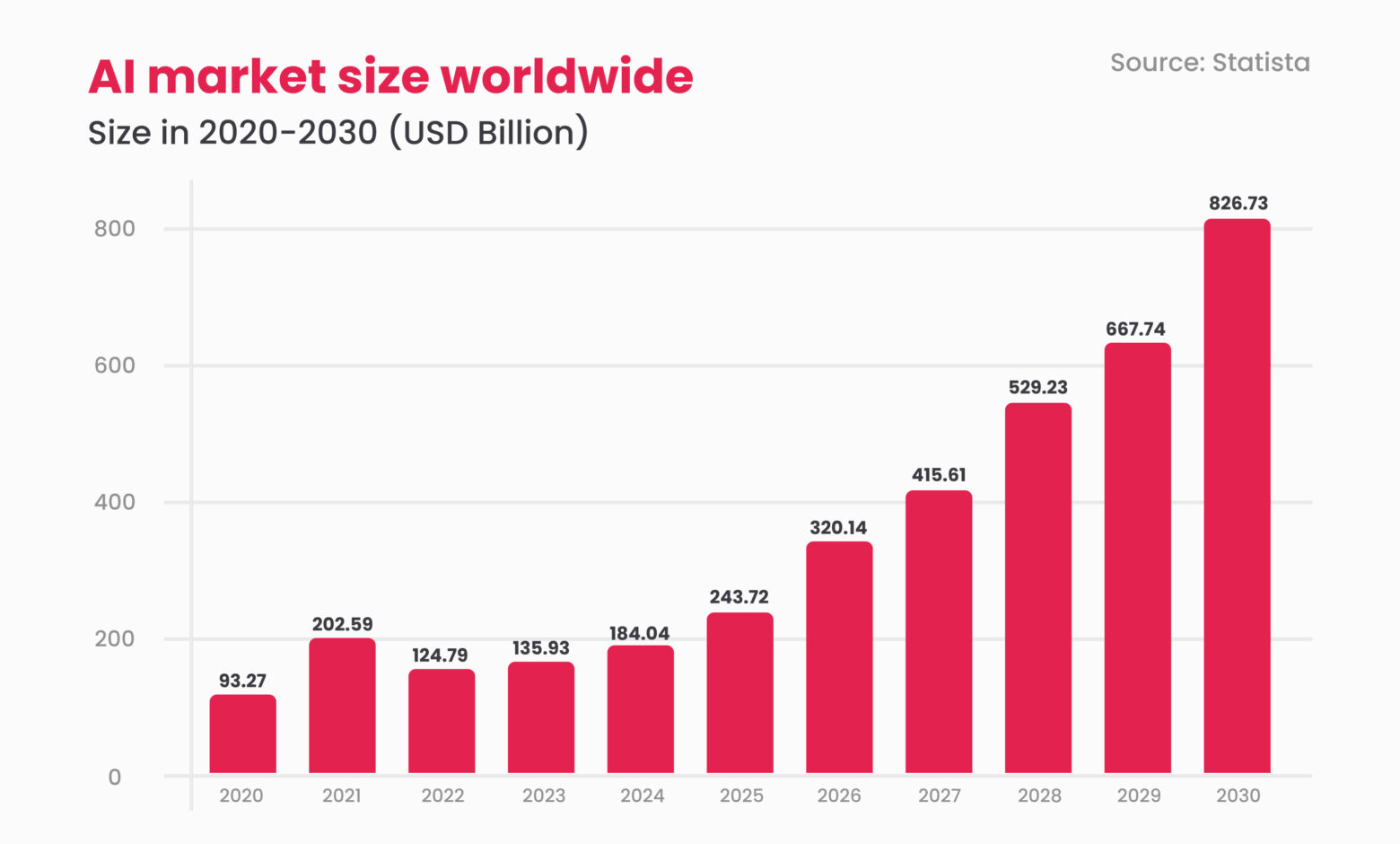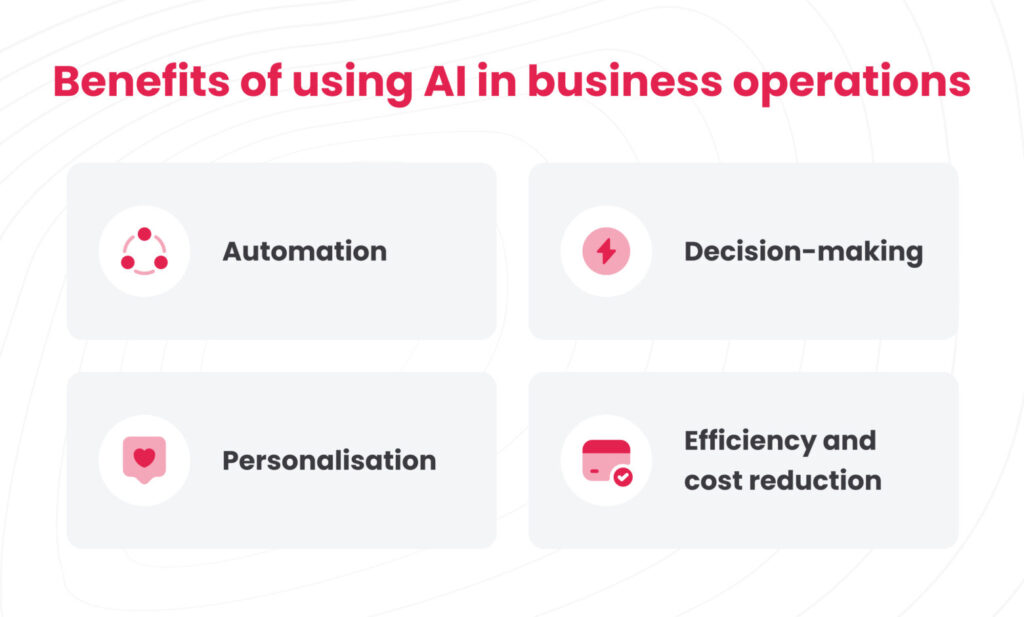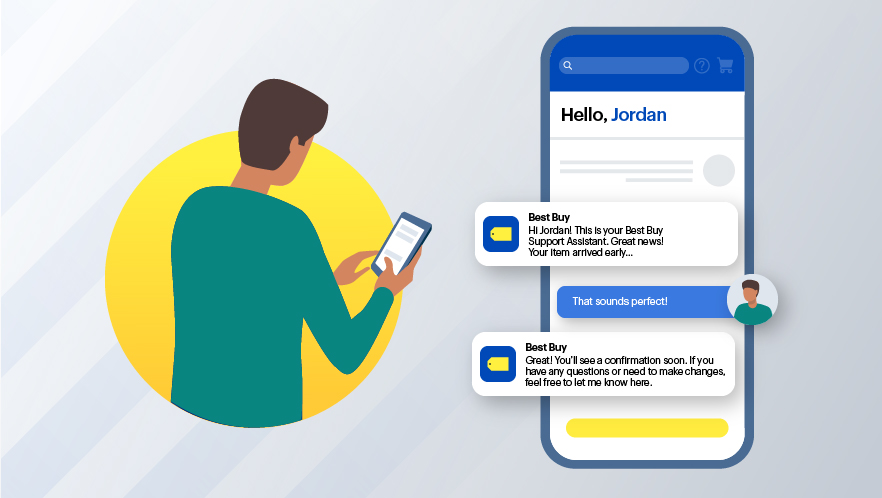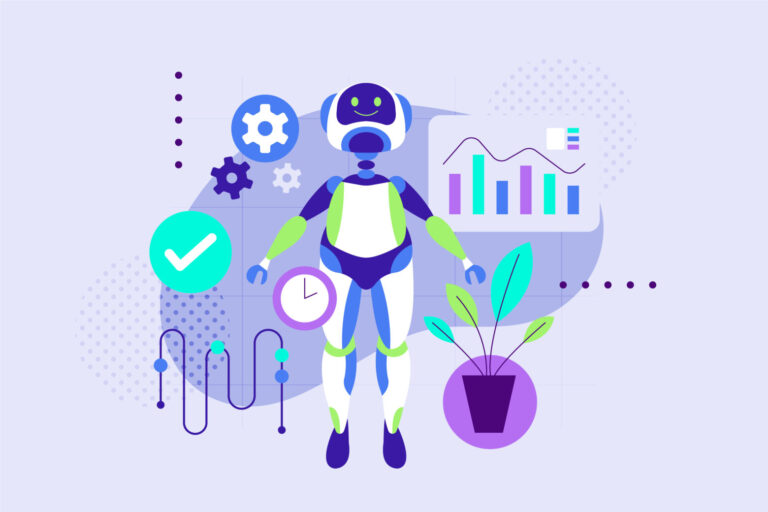Table of Contents
Artificial intelligence is often seen as a shortcut to efficiency—and in many industries, it genuinely is. From speeding up operations to reducing manual tasks, the benefits can be hard to ignore. Some companies even risk falling behind if they don’t use it.
But if the advantages are clear, why doesn’t every business use it?
It’s a complicated question. Some businesses deem it “too expensive”; others don’t know what AI brings to the table. Since it’s a relatively new field, artificial intelligence still remains a mystery for some companies.
See also: The future is now: AI deep dive
AI impact on business: market analysis
Over the last decade, we have seen a shift towards data-driven ways of doing business. And it looks like businesses are eager to adopt this new mindset: based on Cledara’s report, 79% of small and medium businesses are either adopting or already benefiting from AI implementation.
At the same time, 42% of enterprise companies have implemented AI into their workflow.
According to Statista, the artificial intelligence market is projected to reach almost $244,220 million USD in 2025.

It’s reasonable to admit, businesses of all sizes are interested in AI adoption. There are a couple of reasons for this trend:
Substantial investments in AI infrastructure from the EU;
AI becomes more affordable and leads to higher revenue;
Artificial intelligence makes employees more productive.
One of the reasons for the high interest in AI is the abundant big data, which grows by 40% every year. It is expected to reach 163 trillion gigabytes by the end of 2025 alone.
On top of the worldwide trends, here are some of the industry-specific drivers.
AI in educational technology
AI in EdTech is used to personalise the learning experiences of students and automate managerial tasks. Students benefit from it thanks to its high adaptability to their preferences and learning needs, while teachers can
generate new content and automate repetitive tasks. A founder of Khan Academy, Sal Khan, has shared his opinions on the future of education and AI’s place in it:
According to Grand View Research, AI in the EdTech market reached $5,880 million USD in 2024.
The interest in AI comes from the major shift towards online education and the need to streamline managerial tasks in universities and schools.
AI in FinTech
The financial sector is constantly dealing with large amounts of data and transactions. Here, AI’s contribution is immense: it can help detect fraudulent activities, assess risks and offer personalised financial advice.
Chatbots handle routine queries, while other AI-powered solutions can predict market trends and spot suspicious activity.
Recently, Research and Markets stated that AI in FinTech was valued at $2,7 billion USD in 2024.
The main reasons for the interest come from the security and operational efficiency AI brings. For example, Visa has invested $3 billion USD in AI and data infrastructure. This investment only reinforces the ideas Ruzbeh Bacha, a founder of CityFalcon, has shared in a TED Talk:
AI in Healthcare
Healthcare is one of the early adopters of AI use. The applications in this field are vast, from early disease detection to managing hospital resources. According to Markets and Markets, the global AI in healthcare market was valued at $14,92 billion USD in 2024. Based on the 41% CAGR, it is expected that the market will grow to an impressive $164,16 billion USD by 2030.
These high investments are aimed at making healthcare more accessible for everyone. One of the AI consultants from the University of Edinburgh, Leonardo Castorina, has expanded on this idea:
One of the primary market drivers here is AI-powered tools for elder care.
For example, companion robots and virtual assistance address the loneliness older adults might feel, while cognitive assistance software helps mental well-being in a more direct way.
See also: The rise of AI-native technologies
Benefits of using AI in business operations
It might seem that most AI features are targeted at business customers or users rather than internal business workflow. However, with the right implementation, businesses and their employees can benefit from the power of AI. Here’s where it tends to make a clear difference.

Automation
Some corporate tasks are tedious: too complex to finish fast and too easy to be interesting. They tend to take most of the employees’ time, and leave little room for any other responsibilities.
AI can take over repetitive and rules-based tasks—think data entry, appointment scheduling, or sorting customer support tickets. With AI process automation, your employees can focus on more meaningful and important work, increasing efficiency and reducing potential human error.
Decision-making
Nowadays, almost every industry has to deal with large amounts of data. Whether it’s client preferences, market trends, or logistical planning — sometimes it’s too much information for a human to process alone.
AI tools can analyse huge volumes of data and do it fast. They highlight patterns and trends that inform decisions in areas like inventory, pricing, or product development.
Personalisation
Nowadays, personalised experiences are something customers expect any business to provide. However, to make them happen, you need to analyse a lot of customer data.
AI helps deliver experiences that feel more relevant to users. Recommendation engines powered by AI can increase satisfaction and user engagement.
Efficiency and cost reduction
For most businesses, efficiency spells improvement and competitive advantage. A more efficient workforce leads to better business outcomes and saves money in the process.
AI can streamline workflows, reduce waste, and optimise the supply chain. Whether it’s cutting downtime in manufacturing or forecasting sales more accurately, the end result is often the same — streamlined workflow and lower costs.
See also: Implementing AI: Is it worth it? A step-by-step guide to AI implementation
Success stories: how AI improved businesses
It’s one thing to know the benefits AI brings, and it’s another to actually see the improvement. Here are success stories from businesses that adopted AI.
AI-powered Sepsis Watch
Duke University Health System has implemented Sepsis Watch, an augmented intelligence system. This specific approach to AI focuses on assisting humans instead of doing all the work for them. The idea is that AI enhances (or augments) human decision-making rather than automating it entirely.

Sepsis Watch analyses variables—including vital signs, test results, and medical history—from electronic health records every five minutes to identify early signs of sepsis. When potential sepsis cases are detected, the system alerts the team, which helps attending physicians determine appropriate actions, such as initiating treatment or continued monitoring. This integration aims to improve patient outcomes by facilitating timely interventions for sepsis.
PayPal’s AI-powered product recommendations
In January 2024, PayPal unveiled six AI-driven features to enhance user experience and merchant capabilities.

The features include:
Enhanced checkout: a faster payment process by optimising response time
Fastlane: a one-click checkout that doesn’t require usernames, passwords, or manual entry of personal information
Smart receipts: a detailed purchase tracking with the ability for merchants to include personalised recommendations and reward offers within receipts
Advanced offers: insights for merchants into customers’ purchasing behaviour with AI-powered data analysis
CashPass: a personalised cash-back offer for customers
Venmo business profiles: an option for small businesses to add subscriptions, improve profile rankings, and improve promotional capabilities.
PayPal’s actions reflect its strategy to invest in high-potential areas like AI.
AI-powered customer experience at Best Buy
Best Buy has partnered with Google Cloud to integrate generative AI into its customer support services, aiming to improve both customer and employee experiences.

In this collaboration, Best Buy has presented an AI-powered virtual assistant that helps customers resolve product issues, manage orders and subscriptions, and handle memberships. New AI tools will provide customer support with real-time conversation analysis, sentiment detection, and actionable recommendations to improve and personalise the customer experience.
In addition, Best Buy is developing an AI-driven assistant to help store employees access company resources and product guides for better customer service.
U.S. commitment to safe artificial intelligence
The U.S. Department of Veterans Affairs (VA) has developed the AI Use Case Inventory, which includes 227 AI use cases to enhance services for veterans and their families, including improved health risk identification and expedited benefits delivery.
A pilot program involving over 1,500 employees uses generative AI chat interfaces to assist with tasks like drafting emails and summarising documents, with more than 72% of users reporting increased efficiency. AI models also identify potentially fraudulent direct deposit changes, safeguarding veterans’ benefit payments.
This initiative underscores the VA’s dedication to using AI responsibly to improve services and outcomes for veterans.
Zara’s AI-powered business operations
Zara has effectively integrated artificial intelligence into its supply chain operations for enhanced efficiency and responsiveness.

The store employs artificial intelligence to analyse shopping patterns, market conditions, and in-store purchasing behaviors. This allows for accurate demand forecasting, ensuring the company keeps the right amount of stock. It also enables dynamic inventory adjustments, reducing overstock while ensuring product availability for customers.
AI-driven data modelling helps Zara to monitor product popularity. This real-time tracking helps with inventory redistribution to meet demand fluctuations efficiently.
Conclusion
Artificial intelligence is a powerful technology that improves businesses of all sizes. From aiding in customer understanding to minimising delays in healthcare, it enhances workflows and customer experiences.
Although still in its early stages, the influence AI has on businesses is immense. It is logical to assume that this innovation and efficiency will mark a new age of business operations. Sam Altman, founder of OpenAI, confirms this in his recent blog post: “AI will seep into all areas of the economy and society; we will expect everything to be smart.”
How Altamira can help
If you’re looking to adopt AI in your business workflow, assess your AI readiness, prototype your best new idea or bring efficiency to a new level, our approach is guaranteed to leave you satisfied and with zero headaches.
AI experts: we have a proven track record of pushing the boundaries of what’s possible with technology
Tangible value in days, not weeks: visualise your AI concepts with clickable prototypes even before a contract begins
Streamlined development and transparency: get the most value from your investment with continuous improvement and daily or weekly communications.
Contact us to bring your products to the next level with AI.
FAQ about the impact of artificial intelligence on business
AI can help businesses automate repetitive tasks, analyse data faster, and make more informed decisions. It’s especially useful for improving customer service through chatbots, streamlining operations, and cutting down on routine manual work.
However, poorly trained models can produce biased outcomes. Implementation can be expensive and complicated, especially if the existing systems aren’t ready for it. And there’s the risk of over-relying on automation, which can lead to mistakes or the loss of the human touch.
AI can shape business strategies by giving companies clearer insights into their customers, operations, and market trends.
It helps in identifying where to cut costs, where to invest, and how to tailor products or services. That said, its impact depends heavily on the quality of data and the way artificial intelligence tools are integrated into decision-making—not just plugged in and left to run.
Get in touch to learn more about AI’s impact on business strategies
In most industries, artificial intelligence is shifting how work gets done. Manufacturing sees predictive maintenance, retail uses AI for inventory and personalisation, and finance applies it for fraud detection.
While some jobs are becoming more efficient, others are being replaced altogether. It’s less about replacing entire industries and more about changing the roles within them.
For small businesses, artificial intelligence can be a mixed bag. On one hand, accessible tools like customer analytics or marketing automation can level the playing field.
On the other hand, the cost and complexity of more advanced AI tools can be a barrier. Smaller teams may also struggle with the technical expertise needed to set it up properly. The key is using artificial intelligence in targeted ways that solve real problems, not just jumping on the trend.
Contact us to learn more about how you can benefit from AI adoption.






